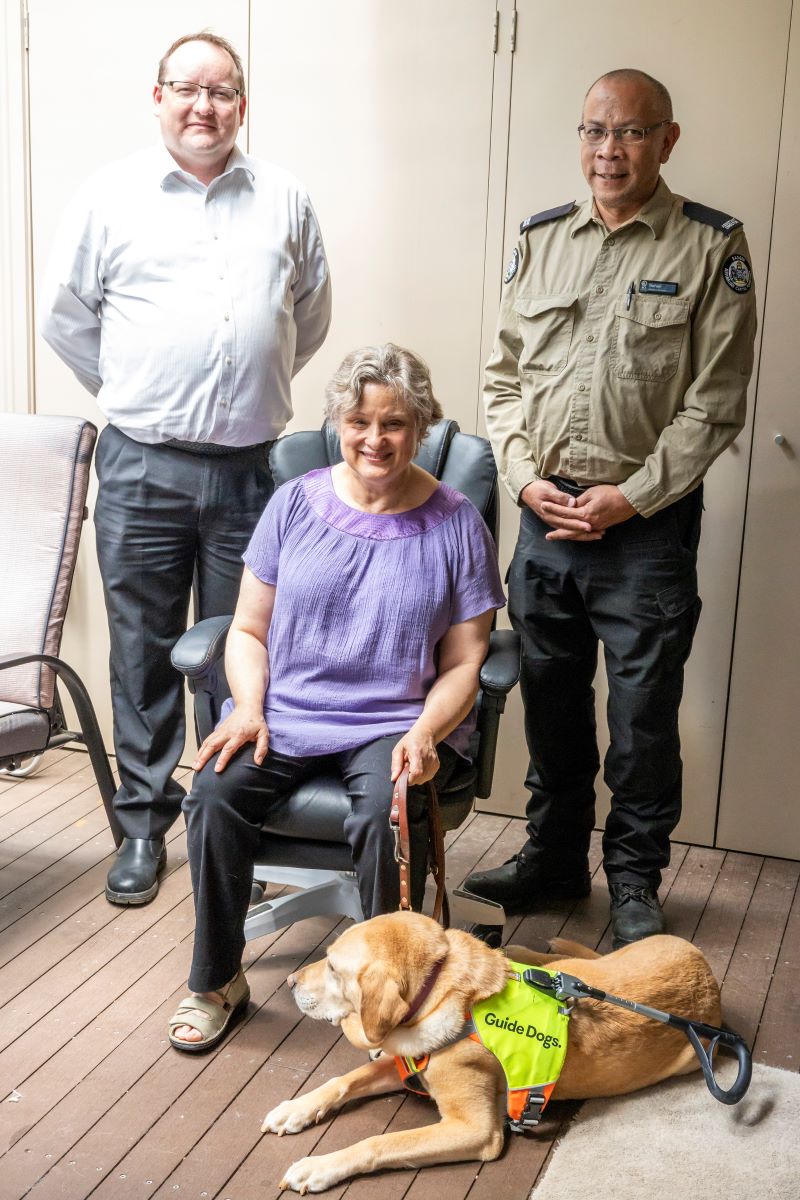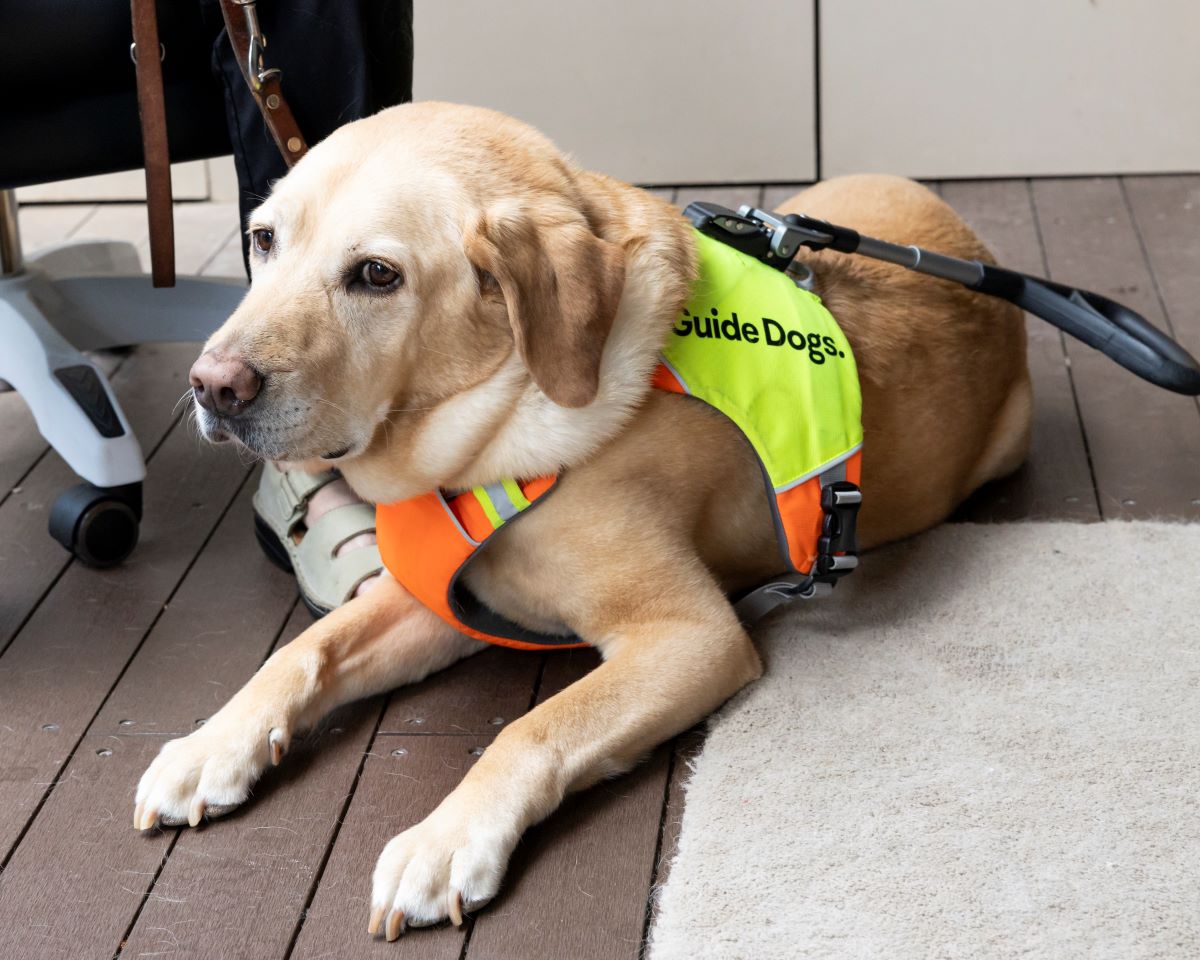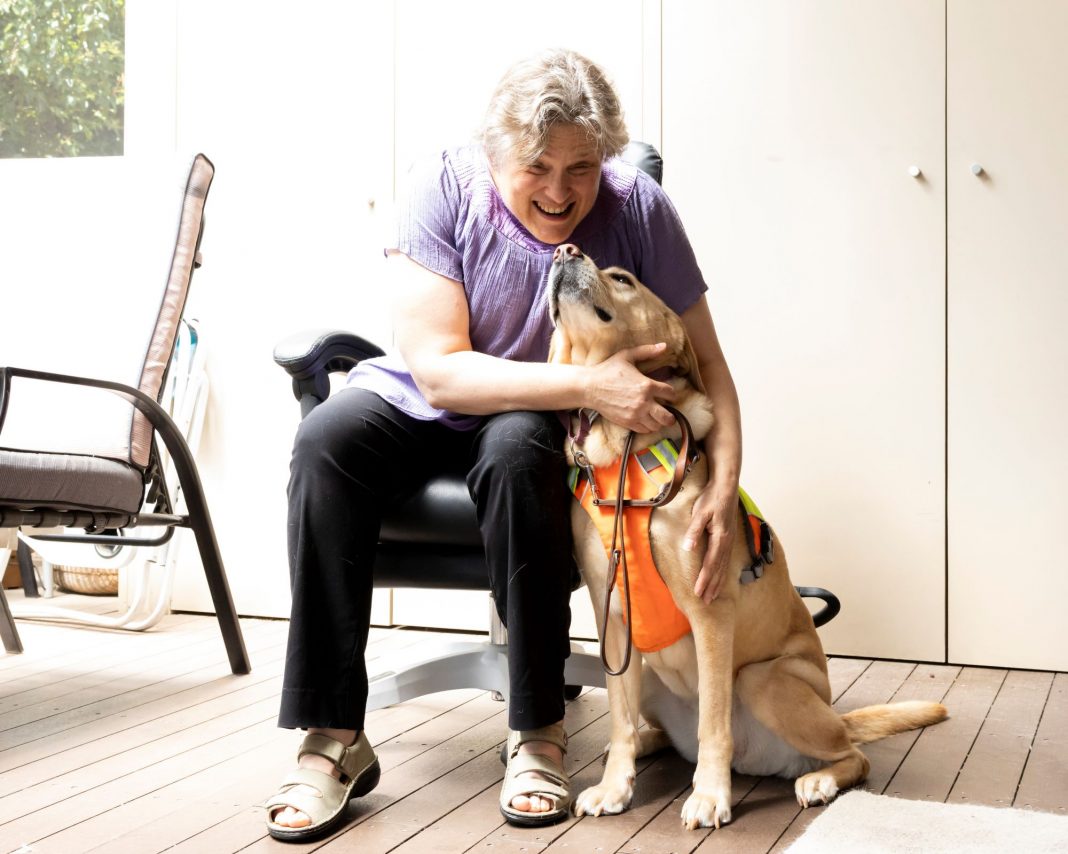Heading to a friend’s house with her mother for lunch, Amanda Heal ordered a taxi just like any other time. The driver called and said they were ten minutes away; hearing the car pull up, Ms Heal and her Guide Dog, Sadie, made their way to the driveway.
“I had Sadie’s leash in my left hand, she was in harness, and I reached out to run the back of my hand along the vehicle which then proceeded to reverse down the driveway and drive away as fast as he could.”
Shocked by what had just happened, she couldn’t believe that the driver would not only leave without so much as a word but would move the car with Sadie so close to it.
Ms Heal and her mother called another taxi, and the driver was appalled to hear what had occurred. Later, Ms Heal phoned Guide Dogs who asked if she would make a formal complaint that would be included in the new legislation.
A motivational speaker, author and lived experience presenter for Guide Dogs NSW/ACT, Ms Heal says this wasn’t the first time she has experienced this kind of treatment.
“I have had taxis, many years ago, drive up to me and then reverse and drive away. I’ve been refused by a couple of Ubers in the past,” she says.
No matter when or where it happens, a rejection and right to basic services affects the individual, especially when it is because of the assistance animal that accompanies them.
“It’s quite upsetting, to be honest, because Sadie is my Guide Dog, she is my closest companion and when someone rejects Sadie, I feel like they are rejecting me as well. It’s personal.”
On top of that emotional toll, it also means that Ms Heal will be late to her destination as she needs to rearrange transport. After her recent experience, she felt apprehensive for a while when organising a lift.
“Mum actually stood with me while we waited for the taxi and made sure that everything was okay. I’m over that now but it causes anxiety and is upsetting,” she says.
Not only was that taxi driver’s behaviour to Ms Heal and Sadie unprofessional and in poor taste, but it was also was illegal under Commonwealth law.
“Assistance animals can go anywhere, anytime – they can go rideshares, cafes, hospitals. There has to be a good reason for refusal, whether that’s behavioural or a hygiene issue, for instance, if a dog was covered in mud,” says Chris Mooney, senior director of Domestic Animal Services (DAS).

Assistance animals can be denied entry into intensive care units, commercial kitchens and some zoos. Mr Mooney says that it is unfortunate that this is still a conversation we are having to have.
“There’s still a lot of mixed messages in the community but the key message here is that they can go anywhere their handler can go,” says Mr Mooney.
In the past year, DAS has only received two complaints about refusal of entry; Ms Heal’s and another where an assistance animal and owner were denied entry into a café. Mr Mooney suspects that these situations go largely unreported.
“I’ve heard on the grapevine that rideshare is quite common. A friend was refused a couple of years ago and he even called assist which is the one that is meant to be for people with disability and he and his Guide Dog were refused,” says Ms Heal.
When it is reported, what happens? The first step is the investigators from DAS need to gather information and speak to those involved, if you have all the facts this can streamline the process.
“You did a great job Amanda to assist us in investigating it by having the exact time and the exact place. We worked with the taxi company and their operation manager and got their GPS locations. The information was very good,” says Rohan Samara, assistant director of Das.
“The maximum penalty is $8,000 for refusing an assistance animal- that includes refusing the animal, the handler or it can include charging an extra fee. Or an infringement of $500 on the spot,” says Mr Mooney.
“Whilst there is a lot of talk about taxi refusals, it is definitely not the taxi companies. It’s just individuals, a few sour apples who taint the name of taxis but it’s not taxi policy,” says Mr Samara.
But what if they are afraid of dogs?
Ms Heal says with the automation of a lot of these services you don’t get the chance to speak to someone to tell them you have an assistance dog with you. She says while she wouldn’t be happy, she would accept if someone was afraid of dogs, if they attempted to fix the situation.
“They’ve called me another cab; they’ve told me why. Even someone who is allergic to dogs, same thing, if they just help me rather than drive away and leave me in the lurch not knowing what’s going on or why,” Ms Heal says.
“It’s a good question, we’d form that as part of the investigation process. Once we got the complaint, we would interview that person and see if there was a reasonable excuse that they would have to prove,” says Mr Mooney.
“Life without a Guide Dog is just not as rich a life; she gives me the confidence to go out, I’m not the most confident traveller and Sadie gives me the confidence to go out and go places,”
Amanda Heal
An assistance animal is not the same as your household pet, although you love them, they have to undertake intensive training and meet strict criteria to be accredited. For example, a Guide Dog is prepared for their role from birth.
“It is a very intensive training, when they are with their puppy trainers for the first 12 months they go to weekly classes and learn basic obedience and get exposed to different environments with their little coast. It is a very intensive, very costly process they go through,” says Heal.
“The ACT has a voluntary framework for assistance animals, there is a process we go through to accredit assistance animals in the ACT. That’s on the basis that they have the right training, they are elevating some sort of disability through medical evidence,” Mr Mooney.
Mr Mooney says that it is an offense to claim that your animal is an assistance dog when it isn’t. He says that claiming your animal is an assistance animal impacts what they are trying to do for the vulnerable in the community.
“If someone is falsely claiming an assistance animal, we recognise other types of animals, not just dogs, you can make a complaint through the same process through Access Canberra animal control and we will investigate it and see what training the animal has actually had,” says Mr Mooney.
Sadie is Ms Heal’s fourth Guide Dog and has been her constant companion since 2015, Ms Heal says that life without Sadie would be restricted. Without a companion, Ms Heal would rely on a cane to help her around which she says it not the same, you can’t move as freely.

“A shopping trolley on the street, you’d have to find your way around it, go back make sure you were travelling in the right direction and keep going. With a Guide Dog, the Guide Dog sees the trolley and just gently goes around it and goes back and you don’t even realise you’ve gone around something half the time,” says Ms Heal.
If you see an assistance animal, the best thing you can do is be aware that they are there but ignore them the trio agrees. Ms Heal says the difference in approach by the public to a working assistance dog to something like a working sheepdog is palpable.
“Don’t pat or distract, if you distract a person’s Guide Dog you could put them in danger. If you have a dog on leash, please keep your dog on leash and let us know you’re coming. If you want to offer us assistance, there is no harm in asking. Worst case scenario, we’ll say no,” says Ms Heal.
Having learned a lot in his role at DAS, Mr Mooney says one important thing he has learned is the importance of always speaking with the handler before speaking to the dog.
“My advice would be just stop for a moment, put yourself in that person’s shoes and have a think about what you can and can’t do,” says Mr Mooney.
“She’s busy doing something, it’s not appropriate, we’re moving, we’re about to cross the road. Respect my decision because I’ve made it for a reason that has my safety involved,” Ms Heal says.
For more information about assistance animals, visit cityservices.act.gov.au/pets-and-wildlife/domestic-animals/assistance-animals
Canberra Daily is keen to hear from you about a story idea in the Canberra and surrounding region. Click here to submit a news tip.



